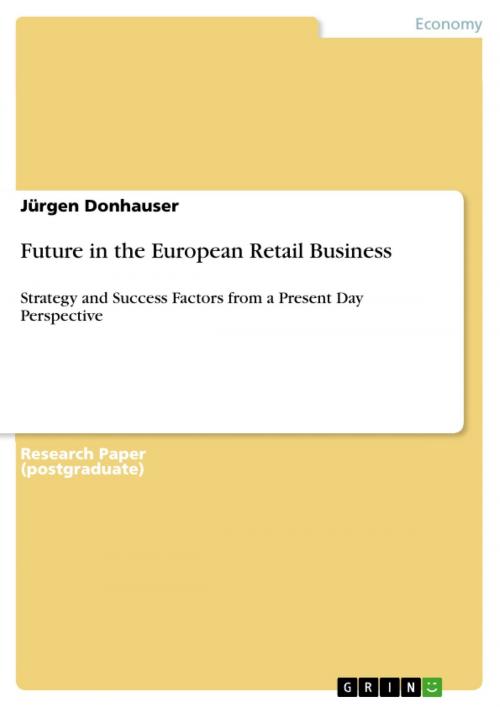Future in the European Retail Business
Strategy and Success Factors from a Present Day Perspective
Nonfiction, Social & Cultural Studies, Political Science, Politics, Economic Policy| Author: | Jürgen Donhauser | ISBN: | 9783656619512 |
| Publisher: | GRIN Verlag | Publication: | March 21, 2014 |
| Imprint: | GRIN Verlag | Language: | English |
| Author: | Jürgen Donhauser |
| ISBN: | 9783656619512 |
| Publisher: | GRIN Verlag |
| Publication: | March 21, 2014 |
| Imprint: | GRIN Verlag |
| Language: | English |
Research Paper (postgraduate) from the year 2012 in the subject Business economics - Economic Policy, Comenius University in Bratislava (Management), course: Vorbereitung Dissertation, language: English, abstract: The first considerations of this thesis developed in 2006 during my second degree course for the MBA degree at the HDU Deggendorf (Germany) and the University of Limerick (Ireland). At the time of this course there was a great discussion at the business schools of the universities that were part of the MBA programme about the influences of the internet commerce on the market potentials in retail. Socalled disruptive strategies by companies such as Amazon (for books) and Unister (for tourism) created massive upheavals in the respective trade segments. The upheaval hit small retailers as much as industry giants. The question for me was if the threats would reach a new pinnacle in the static retail business. Already during my first degree course as a university business graduate (MA equivalent) during the years 1993-1998 (time of the 'new economy' hype) there were enormous market redistributions, then mainly in the financial services sector, but in the early stages already also in the book trade, which often could not be fended off by established companies. The questions that I have been wondering about since are: 'What will the retail market look like in the next few years?', 'How will companies have to act strategically under these aspects?' and 'Are there things that endure and never change (so-to-speak anchor points on the market)?' In my research work over the last few years I have tried to find answers to these questions and looked for potentials for a successful retail business.
Research Paper (postgraduate) from the year 2012 in the subject Business economics - Economic Policy, Comenius University in Bratislava (Management), course: Vorbereitung Dissertation, language: English, abstract: The first considerations of this thesis developed in 2006 during my second degree course for the MBA degree at the HDU Deggendorf (Germany) and the University of Limerick (Ireland). At the time of this course there was a great discussion at the business schools of the universities that were part of the MBA programme about the influences of the internet commerce on the market potentials in retail. Socalled disruptive strategies by companies such as Amazon (for books) and Unister (for tourism) created massive upheavals in the respective trade segments. The upheaval hit small retailers as much as industry giants. The question for me was if the threats would reach a new pinnacle in the static retail business. Already during my first degree course as a university business graduate (MA equivalent) during the years 1993-1998 (time of the 'new economy' hype) there were enormous market redistributions, then mainly in the financial services sector, but in the early stages already also in the book trade, which often could not be fended off by established companies. The questions that I have been wondering about since are: 'What will the retail market look like in the next few years?', 'How will companies have to act strategically under these aspects?' and 'Are there things that endure and never change (so-to-speak anchor points on the market)?' In my research work over the last few years I have tried to find answers to these questions and looked for potentials for a successful retail business.















